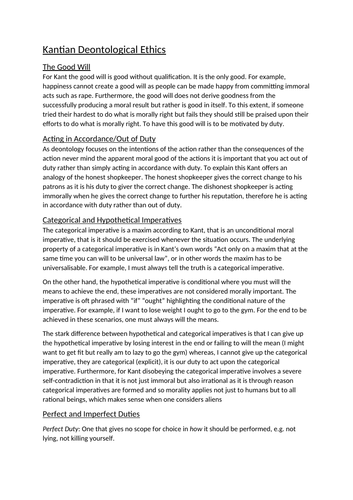
A full set of A* Grade notes for specification 7172 AQA Philosophy
Immanuel Kant’s account of what is meant by a ‘good will’.
The distinction between acting in accordance with duty and acting out of duty.
The distinction between hypothetical imperatives and categorical imperatives.
The first formulation of the categorical imperative (including the distinction between a contradiction in conception and a contradiction in will).
The second formulation of the categorical imperative.
Issues, including:
clashing/competing duties
not all universalisable maxims are distinctly moral; not all non-universalisable maxims are immoral
the view that consequences of actions determine their moral value
Kant ignores the value of certain motives, eg love, friendship, kindness
morality is a system of hypothetical, rather than categorical, imperatives (Philippa Foot).
Get this resource as part of a bundle and save up to 64%
A bundle is a package of resources grouped together to teach a particular topic, or a series of lessons, in one place.
Something went wrong, please try again later.
This resource hasn't been reviewed yet
To ensure quality for our reviews, only customers who have purchased this resource can review it
Report this resourceto let us know if it violates our terms and conditions.
Our customer service team will review your report and will be in touch.
